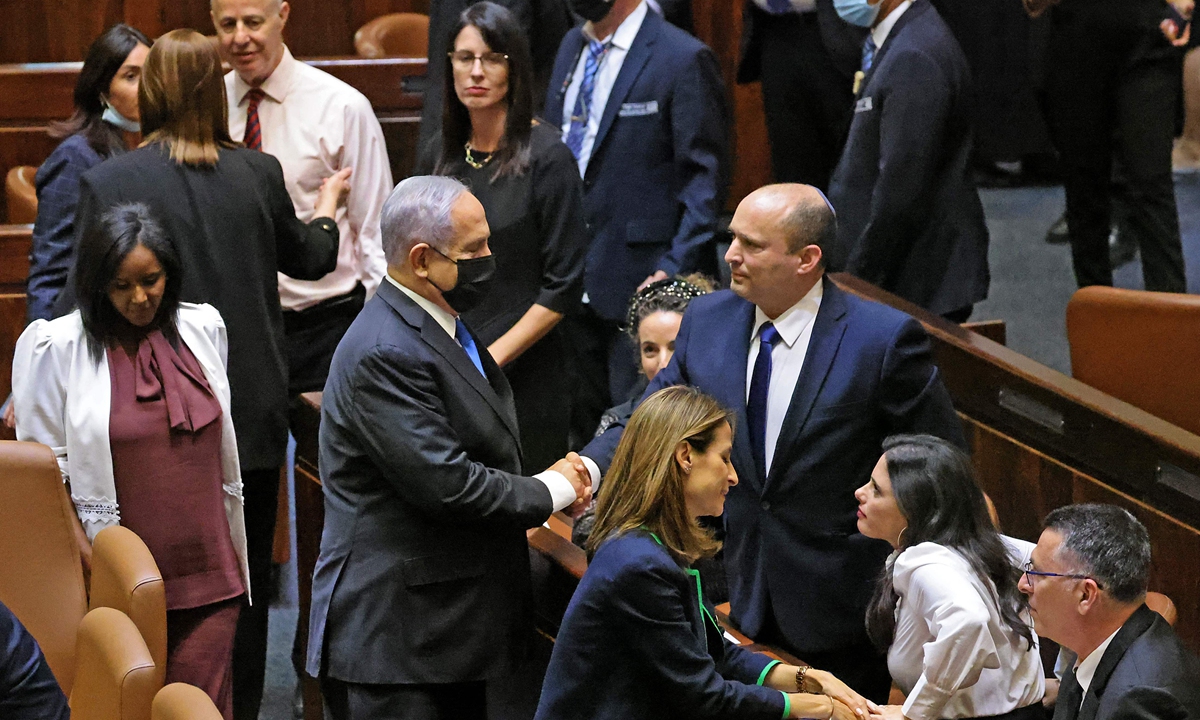Bennett sworn in as Israel PM
Netanyahu’s era comes to end after 12 consecutive years

Israel's outgoing prime minister Benjamin Netanyahu (middle left) shakes hands with his successor Naftali Bennett, after a special session to vote on a new government at the Knesset in Jerusalem on Sunday. Photo: VCG
Naftali Bennett, leader of the right-wing Yamina (United Right) party, was sworn in as the new Israeli prime minister on Sunday night, sending Benjamin Netanyahu to the opposition after a record 12-year rule.
This came after the new coalition government, headed by Bennett and Yair Lapid, leader of the centrist Yesh Atid (Future) party, was approved by the parliament, or Knesset, in a vote of confidence.
In the vote of confidence held in the parliament earlier, 60 lawmakers of the 120-member chamber voted in favor of the new government while 59 voted against it.
TV footage of the parliamentary session showed Bennett and Lapid taking their new seats in the coalition area in the parliament, while Netanyahu, Israel's longest-serving leader, moved to the back seats of the opposition.
At the same time, the 27 new ministers of the new governing coalition were also sworn in.
Bennett and Lapid will rotate as the prime minister on a two-year basis, with Bennett going first. Lapid will serve as Israel's alternate prime minister and foreign minister.
Israel's parliament on Sunday night also elected Mickey Levy, a lawmaker with Yesh Atid, as its new speaker.
The new coalition includes eight parties, including the Islamist Ra'am party, the first Arab faction to be included in a governing coalition in Israel.
The forming of the new coalition government has ended a political crisis in Israel, which has seen four elections in two years.
Netanyahu, aged 71, has been the most dominant figure in the Israeli political scene in recent decades.
For most of his term, Netanyahu took a hard-line approach toward Israel's conflict with the Palestinians. Settlement expansion in the West Bank and Jerusalem continued largely uninterrupted, especially during the four years of former US president Donald Trump's administration.
Under Netanyahu, Israel fought three short wars with Hamas.
Throughout his tenure, Netanyahu was the loudest voice against the Iranian nuclear program on the international stage. In 2015, he went against then US president Barrack Obama and addressed the US Congress in an attempt to torpedo the Iranian nuclear deal, which he failed.
During Trump's years in the White House, Netanyahu enjoyed a friendly US administration which not only turned a blind eye to settlement expansion but also recognized Jerusalem as Israel's capital.
The majority of the international community does not recognize Israel's sovereignty over the whole city, viewing the contentious matter as one to be settled in negotiations with the Palestinians.
Also under US auspices, Netanyahu signed a series of peace accords with Arab countries such as the United Arab Emirates, Bahrain, Sudan, Morocco and Oman.
In his last year in office, Netanyahu faced a global pandemic. Criticized for his handling of the health and economic repercussions of COVID-19, he has been hailed as extricating Israel from the crisis quickly by conducting a highly efficient mass vaccination drive.
The country resumed pre-pandemic life several months ago, with its economy largely bouncing back.
Netanyahu's recent years have been marred by scandals. He is currently on trial on several charges of corruption. Netanyahu has denied wrongdoings and the trial is expected to last for years.
It is his personal handling that led the country to four consecutive elections and an unprecedented political paralysis which has finally resulted in a government without the Likud or Netanyahu.
Netanyahu was also prime minister for a term between 1996 and 1999.



